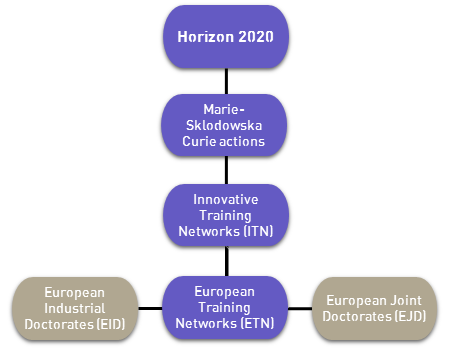List_MAPS is a European Training Network (ETN) project that receives funding from the Research and Innovation programme Horizon 2020 under the Marie-Sklodowska Curie actions.
Different structures ensure the management of the project:
-
The Coordinator: The University of Burgundy is the coordinator institution of the project and is represented by Dr. Pascal PIVETEAU. The role of the coordinator is to monitor the overall implementation of the action (the scientific coordination and the training programme) and to oversee the administrative and financial management.
-
The Project manager: The project manager helps the Coordinator and is in charge of the administrative and financial management of the project and the communication.
-
The Supervisory Board: This entity is composed by one representative of the Coordinator, Beneficiaries, Partners organisations and ESR. It is responsible to establish the network policies, to oversee the operations and the progress of the project, to settle any conflict and to integrate ideas and experience from all partners into the network management.
-
The Research Executive Agency (REA)-Policy Officer: The REA of the European Commission represented by the Policy Officer follow and manage the project at the european level.
DEFINITIONS:
Horizon 2020: is the Research and Innovation programme for 2014-2020. It is divided in three pilars: Excellent science, Industrial leadership and Societal challenges. In the first pilar Excellent science, are the Marie-Sklodowska Curie actions.
Marie-Sklodowska Curie actions(MSCA)-Innovative Training Network (ITN): are a sub-programme of the Horizon 2020 and aim to train a new generation of creative, entrepreunarial and innovative ESRs, able to face current and future challenges and to covert knowledge and ideas into products and services for economic and social benefit.
More details about the Marie-Sklodowska Curie actions
Beneficiaries: are organisations that are full partners of the network. They contribute directly to the implementation of the research training programme by appointing, supervising, hosting and training researchers.
Partners organisations: do not employ the researchers within the project. They provide additional training and host researchers during secondments.
Early-Stage Researchers: are researchers recruited by the Beneficiaries and who are at the time of the recruitment in the first four years of their research career and not have been awarded a doctoral degree.
Secondment: is a period spent by an ESR at the premises of a Beneficiary or Partner organisation other than the Beneficiary which has recruited the ESR under the project.
![]() This project has received funding from the European Union’s Horizon 2020 research and innovation programme under the Marie Sklodowska Curie grant agreement n° 641984
This project has received funding from the European Union’s Horizon 2020 research and innovation programme under the Marie Sklodowska Curie grant agreement n° 641984

